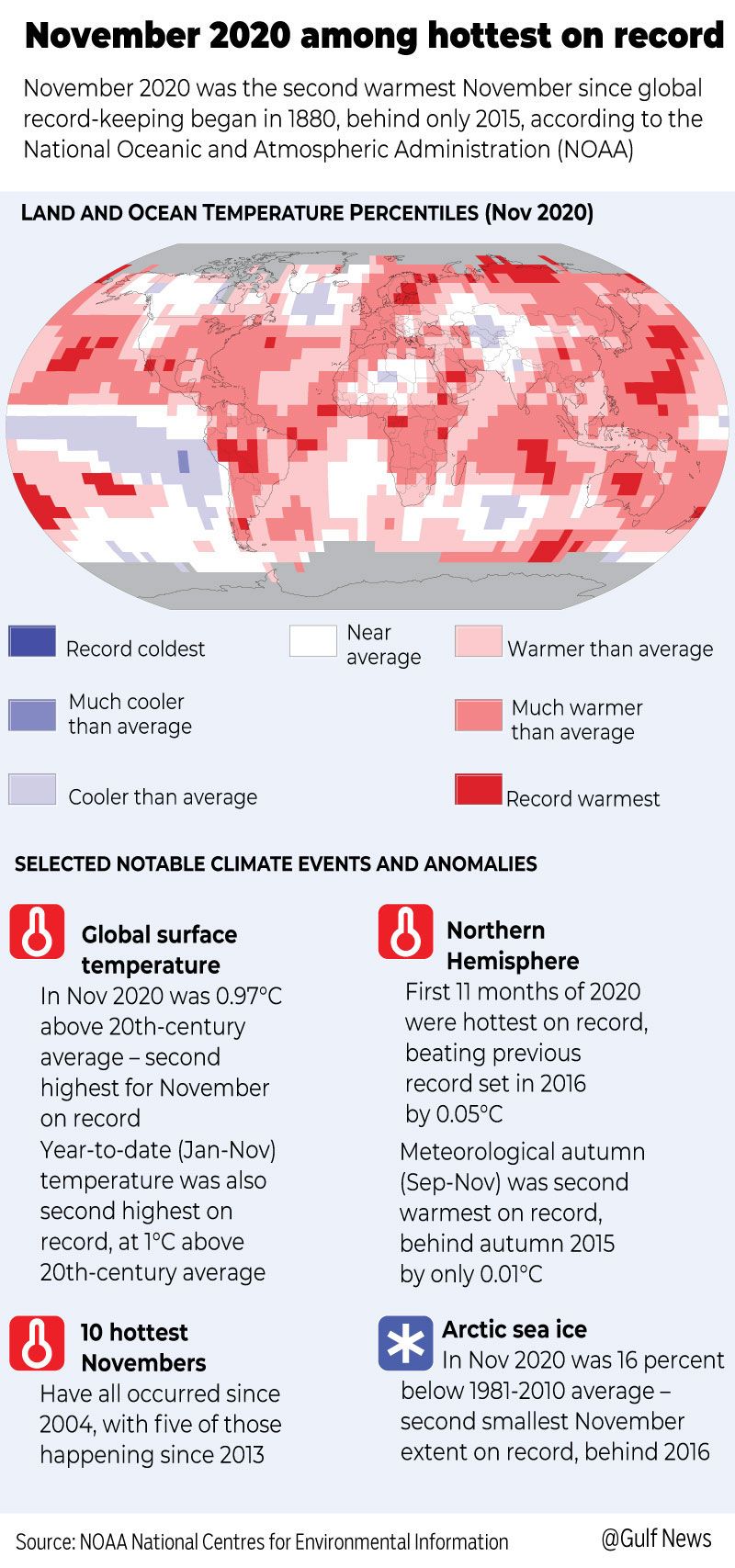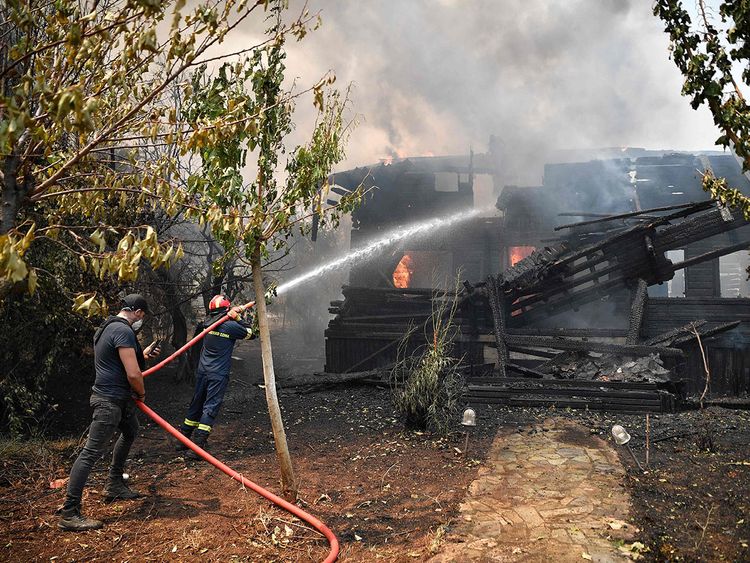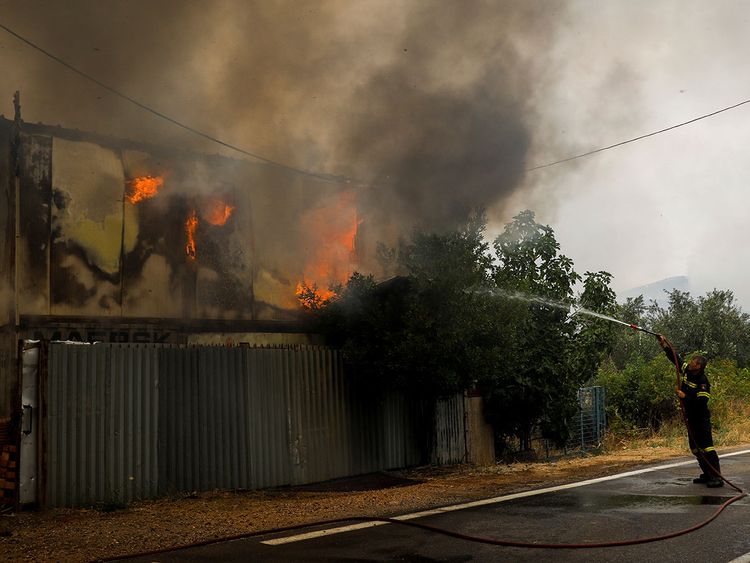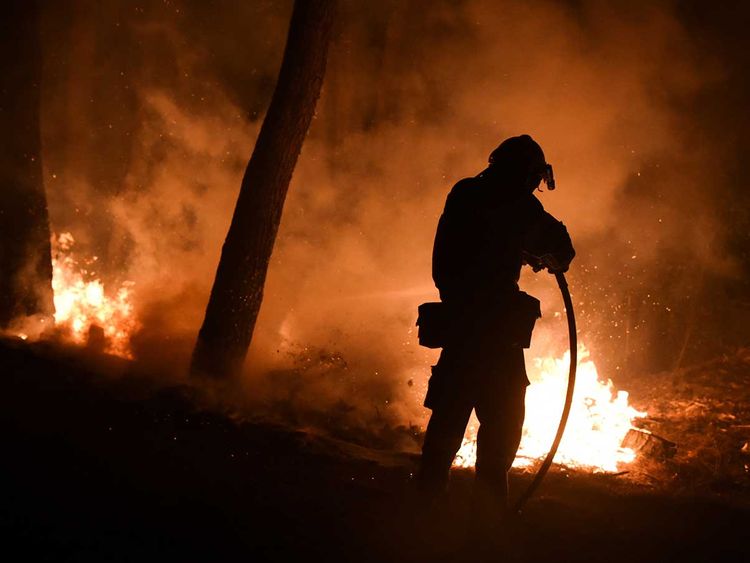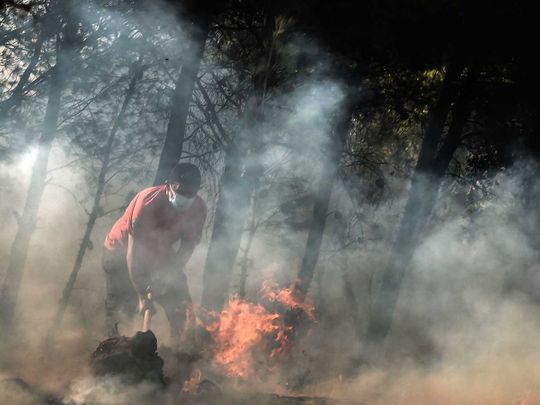
Pefkofyto, Greece: Hundreds of firefighters fought fires that have devoured record numbers of woodlands in Greece on Saturday and left hundreds of families homeless, but heavy rains brought some respite to hard-hit Turkey.
More than 1,450 Greek firefighters backed by at least 15 aircraft were battling the wildfires and flare-ups, with reinforcements arriving from other countries, the fire service said.
"We are sending a team of experienced firefighters to support Greek firefighters currently battling the huge blazes," UK Home Secretary Priti Patel tweeted Saturday.
Egypt is also expected to send two helicopters and Spain one Canadair firefighting plane.
With strong winds and temperatures of up to 38 degrees C (100 F) forecast in some regions on Saturday, the blazes in Greece are expected to continue for some time yet. And this year's fires have already been far more destructive than in previous years.
In the last 10 days, 56,655 hectares (140,000 acres) have been burnt in Greece, according to the European Forest Fire Information System. The average number of hectares burnt over the same period between 2008 and 2020 was 1,700 hectares.
"When this nightmarish summer ends we will reverse the damage as soon as possible," Prime Minister Kyriakos Mitsotakis pledged on Saturday.
In Pefkofyto, in the north of Athens, pensioner Tasos Tsilivakos struggled to contain his tears.
"This is a horrible disaster," he told AFP.
"I'm really afraid that maybe only our great-grand children will have the chance to walk again in these areas."
One 62-year-old man from nearby Agios Stefanos told Alpha TV how after being evacuated he had had to watch his house burning on television. "My child is still crying from the shock," he said.
Rains help Turkey
Greece and Turkey have been fighting devastating fires for more than a week as the region suffers its worst heatwave in decades. Officials and experts have linked such intense weather events to climate change.
So far, they have killed two people in Greece and eight in Turkey, with dozens more hospitalised there during 10 days of the blazes.
A UN draft report seen by AFP labelled the Mediterranean region a "climate change hotspot", warning that heatwaves, droughts and fires would become more fierce in the future, supercharged by rising temperatures.
But the weather gave Turkey some relief Saturday.
Officials in the Turkish coastal city of Antalya said the blazes were under control in the southwestern province after rainfall there.
And heavy rainfall was expected to continue until the afternoon in areas including Manavgat, one of the most affected by the fires.
The situation remained serious however around the tourist hotspot of Mugla, where at least three neighbourhoods have been ordered to evacuate.
There have been over 200 fires in 47 of Turkey's 81 provinces, Agriculture and Forestry Minister Bekir Pakdemirli tweeted early on Saturday. Thirteen of those fires in five provinces are still burning.
Every once in a while, scientists remind us about how climate change is altering the world in which we live. In 2020 we heard of icebergs breaking free, droughts in Africa, wildfires in Australia and floods in Asia. The problem is that ‘every once in a while’ is becoming a regular event. We hear stories of natural disasters more often now than we did two decades ago. Is there a reason for this? Why is there such a steady and rapid change in the climate? Are we responsible for this? And if yes, is there anything we can do about it?
Fears of more high winds
Greek Civil Protection deputy minister, Nikos Hardalias said Saturday that 55 blazes were raging across Greece.
They were burning on Evia, the country's second largest island, which lies east of the capital; in the Peloponnese region in the southwest; and in Fthiotida in Central Greece.
The fire front on Evia alone ran across 30 kilometres long, said Fanis Spanos, regional governor of Central Greece.
On the north of the island, another 23 were evacuated Saturday morning after 1,300 were plucked off the beaches by ferry boats the night before. Navy warships were on high alert off the coast in case more evacuations required.
In the Attica peninsula the situation was "more stable" as there were no strong wind in the area.
Meanwhile officials reopened part of a motorway linking Athens to the north of the country.
Central Greece regional governor Fanis Spanos told the Athens News Agency (ANA) that more than 300 families whose homes had been burned down were being sheltered in hotels.
And the situation remained dire in Mani, in the Peloponnese, where 5,000 people were evacuated Friday.
Eleni Drakoulakou, the mayor of East Mani, told ERT TV on Saturday that half the municipality had been destroyed by the flames. She blamed a lack of water-dropping air support during the critical first hours of the wildfire.
In Ilia, in western Peloponnese, more villages were evacuated.
ANA meanwhile reported that two people had been charged for arson: a woman was arrested in Athens Friday carrying two lighters, petrol and flammable material, just after a fire broke out there.
Also Friday, a 43-year-old man was arrested in Krioneri, northern Attica.
Extremes
Heat waves and droughts, hit all over the world. Siberia reached a record 38 degrees as much of the Arctic was 5 degrees Celsius warmer than average and had an exceptionally bad wildfire season. Arctic sea ice shrank to the second lowest level on record and set a few monthly records for melt.
Death Valley saw the warmest temperature recorded, 54.4 degrees Celsius, on Earth in at least 80 years.
